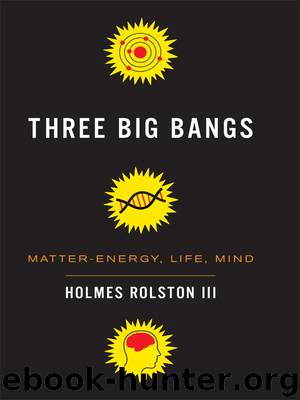Three Big Bangs by Holmes Rolston III

Author:Holmes Rolston, III
Language: eng
Format: epub
Tags: Science/Philosophy and Social Aspects
Publisher: Columbia University Press
Published: 2011-10-21T16:00:00+00:00
Evolutionary Headings: Surprising or Inevitable?
Is evolution going anywhere? If so, are these origins and headings surprising or inevitable? Reflecting on the second big bang, we must return to the same sort of questions about which we puzzled with the first big bang, but now there are more complex dimensions. Something seems to be introducing, layer by layer, new possibilities of order, not just unfolding some latent order already there in the startup. The biological constructions are historical, but they are not simply linear combinatorial processes. True, in the DNA molecules the coding is linear, and the changes are incremental in the linear sequences. But these changes also involve reassorting blocks that reshuffle to produce surprises. A few changes in the linear sequence, resulting from mutations, produce quite different folding patterns at tertiary and quaternary levels in the finished protein (Perutz 1983). Novel possibilities open up whole new regions of search space; old molecules recombine to learn new tricks in unprecedented circumstances. Evolution improvises, sometimes with serendipity.
Evolutionists can make ex post facto explanations. After the events have taken place, the paleontologists can say, well, this is what happened, and this is what resulted. But prior to the events, if asked what would be the result if such and such happened, one could not always, from the knowledge of the constituent parts, predict in advance what the results will be. Much less could one predict that such results had to happen. Perhaps one will say, since it has so often happened in evolutionary history, that there must be some disposition in biological nature to improvise, to be opportunistic, some tendency to co-opt.
But where is such tendency located? Hardly from “bottom up” in the precursor materials, inherited from the first big bang, even with their atomic and chemical possibilities. Hardly either from “top down” in the planetary geological or meteorological systems, likewise inherited from inanimate nature. Ecologists think that environments stimulate speciation. The most obvious cybernetic process lies in genetics, so maybe the possibilities lie in the mid-scale genetics. Steven M. Stanley, in his survey of evolutionary speciation, concludes that even more than being environmentally driven, “The system has been essentially internally driven.” He finds, with emphasis, “evidence of great resilience of the intrinsic rates of origination and extinction that characterize individual taxa” (Stanley 2007:3, 31). The motor of change is not simply challenging environments but prolife organismic drive. Survival of the fittest drives arrival of the more fit, which drives escalating biodiversity and biocomplexity.
So is Darwinian natural selection a sufficient explanation of the emergence of complexity over time? Darwinian natural selection once did not exist; it also had to emerge, at the origin of life. Once under way, across evolutionary natural history the innovations have never violated natural selection; there is always (in principle at least) an explanation in terms of natural selection—at least retrospectively. But prospectively, might the origin and evolution of life have been predicted? Elements of chance and drift appear, and natural selection itself involves elements of randomness, as in mutations.
Download
This site does not store any files on its server. We only index and link to content provided by other sites. Please contact the content providers to delete copyright contents if any and email us, we'll remove relevant links or contents immediately.
The Lost Art of Listening by Michael P. Nichols(7500)
Why I Am Not A Calvinist by Dr. Peter S. Ruckman(4151)
The Rosicrucians by Christopher McIntosh(3516)
Wicca: a guide for the solitary practitioner by Scott Cunningham(3171)
Signature in the Cell: DNA and the Evidence for Intelligent Design by Stephen C. Meyer(3134)
Real Sex by Lauren F. Winner(3021)
The Holy Spirit by Billy Graham(2946)
To Light a Sacred Flame by Silver RavenWolf(2816)
The End of Faith by Sam Harris(2738)
The Gnostic Gospels by Pagels Elaine(2529)
Waking Up by Sam Harris(2457)
Nine Parts of Desire by Geraldine Brooks(2366)
Jesus by Paul Johnson(2356)
Devil, The by Almond Philip C(2328)
The God delusion by Richard Dawkins(2307)
Heavens on Earth by Michael Shermer(2281)
Kundalini by Gopi Krishna(2183)
Chosen by God by R. C. Sproul(2162)
The Nature of Consciousness by Rupert Spira(2106)
